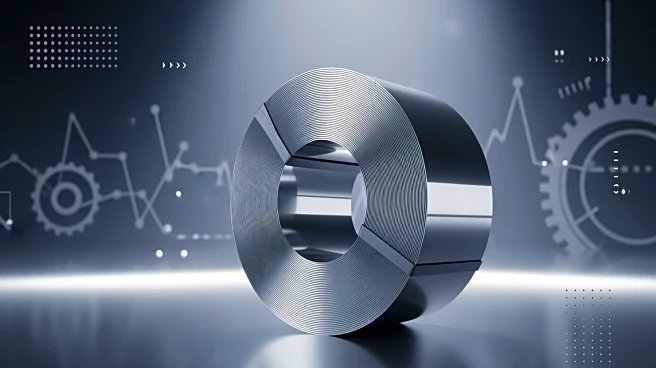What's Happening?
Aperam, a global player in stainless, electrical, and specialty steel, reported a net loss of EUR 21 million for the third quarter of 2025, compared to a net income of EUR 19 million in the previous quarter.
The company faced a seasonal slowdown and price pressures across its European operations. Despite these challenges, Aperam generated strong free cash flow of EUR 138 million, reducing its net financial debt to EUR 1,045 million. The company's strategic initiatives, including the Leadership Journey® Phase 5, contributed EUR 29 million in gains during the quarter. Aperam's CEO, Timoteo Di Maulo, emphasized the company's focus on transformation and resilience amidst market conditions.
Why It's Important?
Aperam's financial results highlight the ongoing challenges faced by the steel industry, particularly in Europe, where price pressures and seasonal slowdowns impact profitability. The company's ability to generate cash and reduce debt is crucial for maintaining competitiveness and positioning for recovery. Aperam's strategic initiatives aim to enhance operational efficiency and cost savings, which are vital for navigating market volatility. The results also underscore the importance of strategic planning and adaptability in the face of economic headwinds, which can affect industry stakeholders and investors.
What's Next?
Aperam expects adjusted EBITDA in the fourth quarter of 2025 to be slightly lower than the third quarter. The company plans to continue reducing its net financial debt by more than EUR 200 million by the end of 2025. Aperam's leadership transition, with Sudhakar Sivaji taking over as CEO in January 2026, will be pivotal in driving the company's strategic direction. The European Commission's proposal to address global overcapacities in the steel sector may also influence Aperam's operations and market positioning. The company's focus on sustainability and circular economy initiatives will remain central to its long-term strategy.
Beyond the Headlines
Aperam's commitment to sustainability and the circular economy is a key aspect of its business model. The company's initiatives in recycling and renewable energy, along with its low carbon footprint production capabilities, align with global trends towards environmental responsibility. These efforts not only enhance Aperam's market appeal but also contribute to broader industry shifts towards sustainable practices. The leadership transition and strategic focus on transformation may also influence Aperam's corporate culture and stakeholder engagement, impacting its long-term growth and innovation potential.











